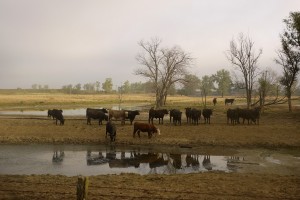Texas Mayors Stress Need For More Water Conservation and Less Red Tape

By: Scott Olson
The drought has affected cattle herds across Texas and the Midwest. Texas lawmakers are considering funding a water plan that could protect the state's water supplies.
“Whiskey is for drinking and water is for fighting,” said John Cook, Mayor of El Paso, echoing Mark Twain at the House Natural Resources Committee meeting that began early this morning.
Mark Twain may have changed his tune, though, if he saw the Capitol meeting room tightly packed with mayors from Texas’ largest cities, lawmakers and water authority officials, all unified in their support of using billions of state dollars to finance water projects across the state.
Whiskey is for drinking, and water is for funding, Twain might have said. (If in fact he ever said the original quote, which is doubtful.)
While there was no shortage of state and city officials touting the necessity of funding the state water plan, many acknowledged the hurdles ahead, including the complex application and permitting process for new projects, which can last years, and the need to conserve and be more efficient with the water we already have.
With such broad support from Texas officials, the question doesn’t seem to be whether water projects will be funded, but rather, how will projects be prioritized and funded efficiently?
“You do have an economic stabilization fund that is brimming, you have a dire need in this plan, and I believe 2011 has helped all of us recognize the severity of the problem if we don’t take action. I think you’re at the right place at the right time,” said Kip Averitt, Principal of Averitt & Associates and former state senator and chairman of the Senate Natural Resources Committee.
Speakers at the meeting were commenting on HB 4, a bill written by the chairman of the Resources Committee, Rep. Allan Ritter, R-Nederland. That bill would create a fund that pay for projects in the State Water Plan.
But before any of those projects, like new reservoirs or water desalination plants, can be funded, they will have to be permitted by the Texas Commission on Environmental Quality (TCEQ), and that process can be burdensome and time consuming, said Mike Rawlings, Mayor of Dallas.
Rawlings cited the doomed Lake Fastrill reservoir, which would have been on the Neches River near Dallas, as an example of unnecessary red tape.
“The lengthy permitting process creates uncertainty. It creates a situation where local governments must make a wager on getting water,” Rawlings said.
Rep. Eddie Lucio, D-Harlingen, said that the length of time necessary to permit and fund projects is often dictated by federal regulations and auditing.
Another string running throughout the meeting testimony was the need for conservation across the state.
Officials from around the state will be looking to cities like El Paso, a leader in conservation, to find new ways to use water more sparingly and efficiently. El Paso is in year 15 of a 7-year drought, said Cook, the city’s Mayor.
Cook said his city has used both a carrot and stick approach to promoting conservation. For instance, they have bought turf grass from residents who then xeriscape. They also increased water fees on residents that had higher water use in the summer. El Paso is also home to the world’s largest inland desalination plant.
Rawlings said Dallas has been on mandatory watering restrictions, twice per week, since 2012. Those watering restrictions are in place year-round, regardless of whether they are in drought or not, he added.
“We found that if we do that, it will extend our water usage by ten years,” Rawlings said. “That’s a lot of time. You can do a lot of things in ten years and get through the regulatory process.”
The meeting went on for much longer, into the evening, with over eight hours of invited testimony from other officials, companies and environmental groups, and then public testimony after that.

